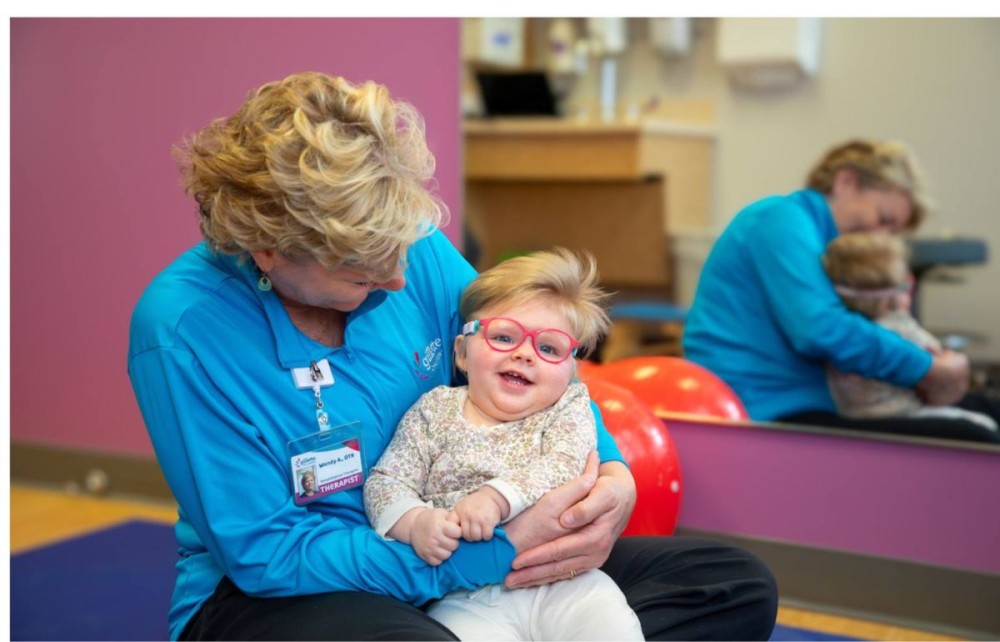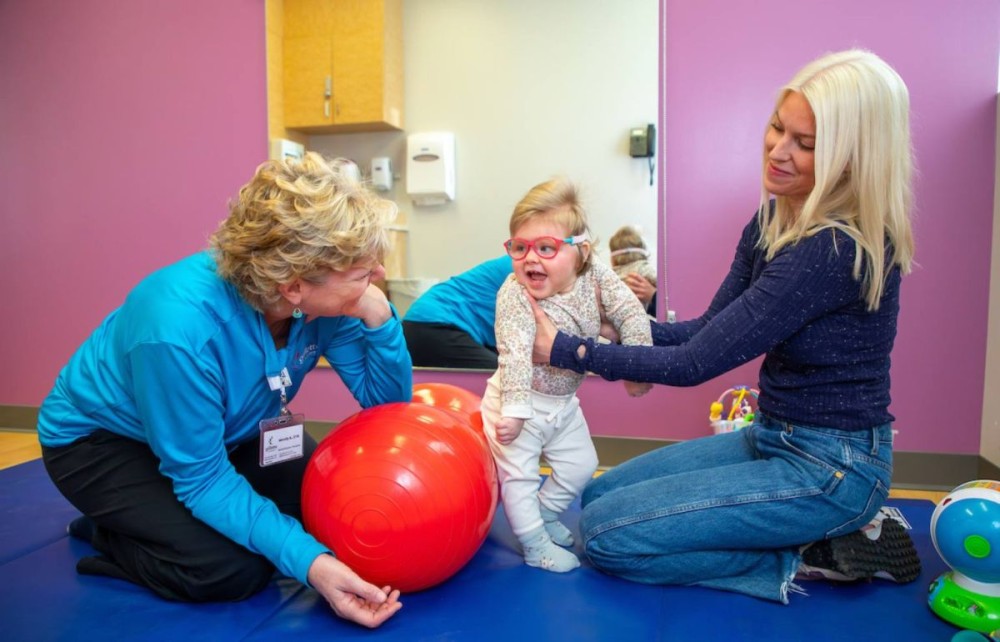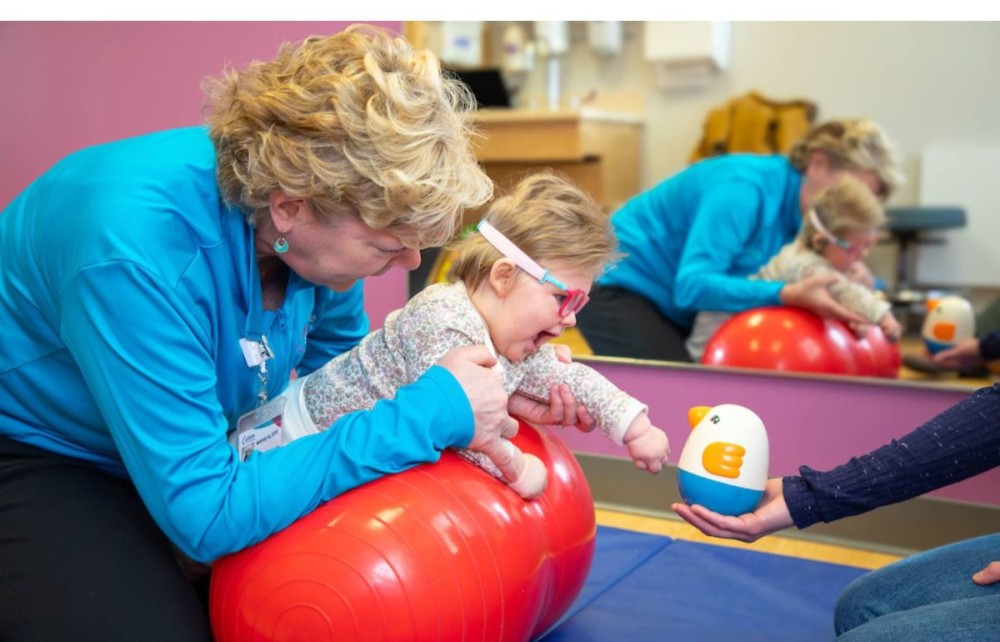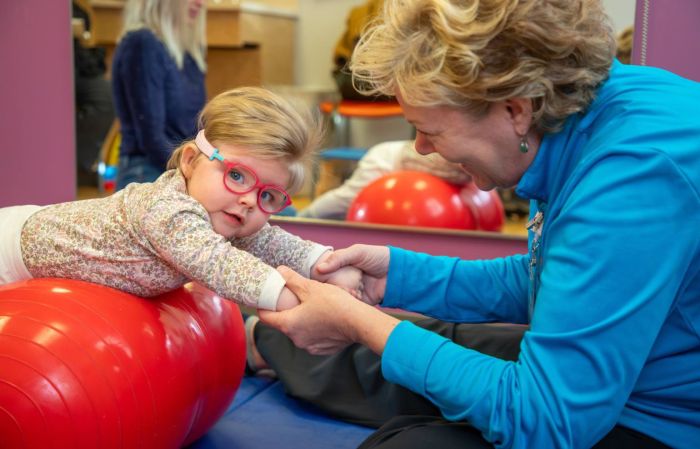Parents concerned about a child exhibiting differences in movement, play, learning, or communication can get good advice from the highly trained occupational therapy (OT) team at Gillette Children’s.
The OT team is a key contributor to the Gillette Infant and Toddler Development Evaluation. It is a comprehensive evaluation by a team of specialists that can help parents and primary care providers find answers and start building a treatment plan for a child.
“As occupational therapists, our role is to look at typical and atypical movement patterns, reflexes, head and trunk control, muscle tone and function, and to assess a child’s skills,” says Gillette OT Wendy Aeling.

Elliana's mother says she admires how caring and creative Gillette OT Wendy Aeling is when working with her daughter.
What makes Gillette OTs stand out
Aeling has been an OT for more than 36 years and has specialty training in the General Movement Assessment (GMA) evaluation. Aeling and her OT team members provide an early diagnosis to craft a comprehensive treatment plan that helps an infant or toddler gain skills and improve their lives.
“Gillette is different from other treatment clinics,” Aeling says. “Everyone on the Gillette team has their place and expertise. It really makes us stand out.”
Aeling loves being part of a multilayer care team at Gillette. “As occupational therapists, we work closely with physical therapists (PT), speech therapists (SLP) the pediatric rehabilitation medicine physicians (PM&R), and other therapists at Gillette. We can reach out to other Gillette teams, such as assistive technology, and make sure each child has what they need.”
The OT team often consults with Gillette speech language pathologists (SLP) to work on ways to help a child’s speech production, communication and swallowing.

Elliana's mother, Rachel, is a physical therapist herself and is pleased the Gillette therapists work with families to come up with functional goals for each child.
A focus on what a child CAN do
Elliana Summers and her mother, Rachel, have been working hard in OT sessions with Wendy Aeling at the Maple Grove Clinic since the summer of 2023. Elliana was born in March of 2023 and started her OT sessions when she was about 5 months old.
“I just love the creativity of the therapists at Gillette,” Rachel says. She is a physical therapist herself and works with geriatric patients.
“As a therapist myself, I’m amazed how the team at Gillette makes the hard work of therapy fun for children. It really takes a lot of care skill. It’s a gift.”
Elliana receives care from several Gillette providers and is still undergoing testing to determine the scope of her health challenges.
“Elliana and I really look forward to coming to Gillette,” Rachel says. “The whole focus is on what my child CAN do and not on her limitations. That’s an uplifting and positive message for families to hear.”
Help with everyday life skills and feeding
The Gillette OT team specializes in assessing and treating motor and sensory skills and can help each child build the skills they need to perform everyday functions such as playing, dressing, or other daily activities.
In addition, the OT team can help with feeding issues. “We can help with a variety of feeding concerns,” Aeling says. “Right from birth we can help parents with nursing concerns, and we can help transition to pureed foods and then solids. We can also help with reflux and G-tube feedings. Basically, we can assist with anything that impedes eating and nutrition.”
The Gillette OT team is part of the complex feeding clinic. This is an appointment where speech therapists, dieticians, psychologists, and other team members work together in one clinic to assess feeding and nutrition issues.
“Many people don’t realize how important feeding can be to the parent/child relationship,” Aeling adds. “The need to feed your child is such a basic maternal and paternal need. We can help make feeding more successful and that makes children and caregivers happier.”

Gillette OT Wendy Aeling makes the hard work of therapy fun. She helps Elliana work on her hand strength and coordination by having her reach for a toy.
OTs partner with families
The occupational therapy team at Gillette works with families to come up with functional goals for each child.
“We have a useful tool that is called the Canadian Occupational Measure of Performance Evaluation (COPM),” Aeling says. “We have parents rate how important certain goals are for their child. This is useful because we don’t want to overwhelm families. With this tool, the families can guide us as therapist so we can work with the child on what is the most pressing need,” Aeling adds.
As a parent, Rachel Summers is grateful for this approach. “From her OT sessions at Gillette I can see how Elliana’s core strength and her control of her hands has improved,” Rachael says. “Elliana now has more knowledge about how her body moves and she’s more confident when she reaches for things and plays with toys. She’s also more open to learning about her environment.”
Wendy Aeling is pleased with Elliana’s progress and says, “One of the biggest reasons why I love Gillette is that we take a very proactive approach to treatment. The earlier we can see a child and help a family, the better.”
Request an Infant and Toddler Development Evaluation
To request an evaluation for your infant or toddler, fill out our online appointment request form. Someone will get in touch to schedule you with a specialist.
During your appointment, you can expect to be seen by experts who specialize in the identification of developmental delays including a physiatrist (PM&R), a neurologist, and trained therapists—including occupational therapists. These experts will analyze results form multiple assessments and work with you to create a comprehensive treatment plan.
 Home Page
Home Page

